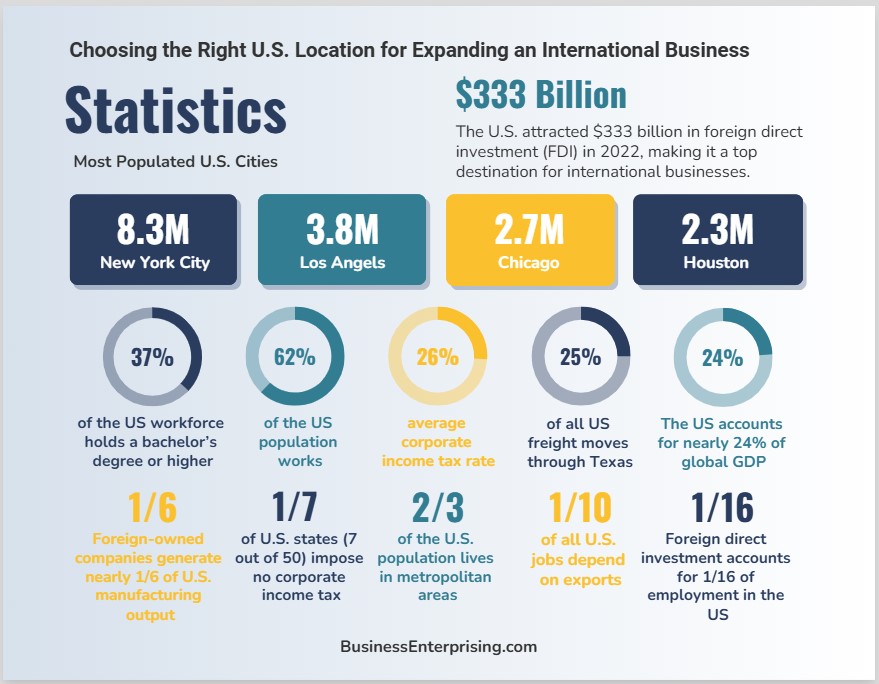 Expanding your business into the United States offers significant opportunities, but choosing US business locations requires thoughtful planning. The US is diverse, with regions offering unique advantages. From workforce availability to cost differences, each factor plays a role in long-term success. Understanding market needs and aligning them with your goals can strengthen your operations.
Expanding your business into the United States offers significant opportunities, but choosing US business locations requires thoughtful planning. The US is diverse, with regions offering unique advantages. From workforce availability to cost differences, each factor plays a role in long-term success. Understanding market needs and aligning them with your goals can strengthen your operations.
The right location can improve access to resources, reduce costs, and enhance market reach. With so many options available, evaluating infrastructure, local culture, and economic conditions becomes essential. By weighing these factors carefully, you can make informed decisions that support your business growth in the US.
Understanding Regional Business Climates in the US
Understanding regional business climates in the US is key when expanding your operations. Each region offers unique economic conditions and opportunities. The Northeast is known for its financial services, healthcare, and technology sectors. Cities like Boston and New York stand out for their established industries and access to talent. If you value proximity to decision-makers, this region might align with your goals.
In the Midwest, manufacturing, agriculture, and logistics dominate the economy. States like Ohio and Indiana provide cost-effective options for industries requiring large-scale operations. Cities such as Chicago and Detroit offer access to skilled labor and strong infrastructure, making them appealing choices.
The South is recognized for its lower operating costs and growing technology and energy sectors. States like Texas and Georgia are home to business-friendly cities such as Austin and Atlanta. These areas combine affordability with a skilled workforce, which can support long-term growth.
The Western US is a hub for technology, entertainment, and green energy. California’s Silicon Valley remains a global tech leader, while states like Washington and Colorado attract startups and established firms alike. Cities like Seattle and Denver stand out for their innovative environments and well-connected networks.
When choosing US business locations, consider how each region aligns with your industry and goals. Evaluating economic conditions and city-specific advantages can guide your decision effectively.
Tax Incentives and Regulations by State
Tax incentives and regulations vary widely across the United States, making it important to understand state-specific policies. Corporate income taxes, sales taxes, and property taxes differ significantly by location. Some states, like Wyoming and South Dakota, have no corporate income tax, while others, such as California and New York, impose higher rates. These variations can impact your long-term profitability.
Many states offer incentives to attract foreign businesses, including tax credits, grants, and exemptions. For example, Texas provides tax abatements for companies investing in local economies. Similarly, Florida offers programs to reduce taxes for businesses creating new jobs. These incentives can lower your operating costs and make certain states more appealing.
Regulatory environments also play a key role when choosing US business locations. States like Delaware and Nevada are known for their business-friendly legal frameworks. Others may have more complex regulations, which could require additional planning. Evaluating the ease of obtaining permits, meeting compliance standards, and accessing local government support can save time and resources.
When deciding where to expand, consider both tax policies and regulatory factors. They influence the overall cost of doing business and the efficiency of your operations. By comparing state-specific advantages, you can identify locations that align with your goals.
Access to Skilled Labor and Workforce Availability
Access to skilled labor and workforce availability is a key factor when expanding your business into the United States. Different regions offer varying talent pools and education levels. For example, areas like the Northeast are home to highly educated workers due to the presence of top-tier universities. Meanwhile, regions like the South focus on skilled trades and technical expertise.
Proximity to major universities and training centers can provide a steady stream of qualified employees. Cities such as Boston, home to MIT and Harvard, excel in technology and life sciences talent. Similarly, cities like Austin benefit from their connection to institutions like the University of Texas, fostering innovation in technology and engineering fields.
Industry-specific workforce availability also varies by location. The Midwest, with its manufacturing legacy, offers an abundance of experienced workers in industrial and logistics roles. The West Coast, on the other hand, attracts technology professionals, making it a hub for software development and engineering. Understanding where your industry thrives can help when choosing US business locations.
By evaluating regional education systems, training opportunities, and industry presence, you can identify locations that meet your workforce needs. These factors directly impact your ability to recruit and retain skilled employees, ensuring long-term success.
Infrastructure and Transportation Networks
Infrastructure and transportation networks play a key role when choosing US business locations. Proximity to major ports, airports, and highways can impact supply chains and distribution efficiency. For example, ports like Los Angeles and Houston are gateways for international trade, while cities like Atlanta and Chicago are central hubs for highways and railways.
Modern facilities, such as business parks, tech hubs, and logistics centers, also contribute to operational success. Areas like Silicon Valley provide technology-focused resources, while cities like Memphis are known for their advanced logistics infrastructure. Access to these facilities can streamline your operations and reduce costs.
Public transportation and connectivity are additional factors to consider. Urban centers like New York and Washington, D.C., offer robust transit systems that support employee commuting. Meanwhile, regions with well-connected airports, such as Dallas or Denver, enable faster travel and shipping. Evaluating these elements ensures your business stays accessible to employees, customers, and partners.
When expanding your operations, assess the transportation and infrastructure in your target region. These considerations can make a significant difference when choosing US business locations, supporting long-term growth and efficiency.
Cost of Living and Operating Expenses
Cost of living and operating expenses vary widely across the United States, and these differences can influence your business decisions. Real estate costs in cities like New York and San Francisco are significantly higher compared to places like Dallas or Nashville. Utilities, wages, and other operational expenses also fluctuate by region, which can impact your budget planning.
Balancing affordability with access to resources is essential. While lower-cost areas may reduce expenses, they may lack the talent or infrastructure needed for your business. Conversely, higher-cost regions often provide greater access to skilled workers, advanced facilities, and robust transportation networks. Finding the right balance can support your growth goals.
Cost factors also directly affect your long-term sustainability. Lower expenses may improve profitability, but limited resources could hinder scalability. When choosing US business locations, carefully analyze both the short-term savings and long-term value of each region. Thoughtful planning will help you identify a location that supports your financial and operational needs.
Cultural and Market Alignment
Cultural and market alignment plays a critical role when choosing US business locations. Understanding the target demographics and their preferences helps you position your products effectively. Different regions cater to distinct markets, so selecting a location that matches your audience’s needs can improve market penetration.
Considering local culture, diversity, and language accessibility can also impact your success. Areas like Los Angeles and Miami are known for their diverse populations, making them ideal for businesses targeting multicultural audiences. Choosing a location that reflects your brand values and customer base helps establish trust and connection with local communities.
Many foreign companies have successfully aligned their operations with US markets by selecting strategic locations. For example, Toyota expanded in Texas to tap into a growing automotive market and skilled workforce. Similarly, Uniqlo chose New York to connect with its fashion-forward audience. These examples show how thoughtful planning enhances outcomes when choosing US business locations.
By aligning your business with the right market and cultural environment, you can enhance customer relationships and long-term growth potential. Researching local characteristics and industry trends ensures your choice supports both operational needs and strategic goals.
Conclusion
Choosing US business locations requires careful consideration of multiple factors. By evaluating regional differences, you can identify the best match for your goals. Infrastructure, workforce availability, and cost are just a few elements that directly impact success. Considering cultural alignment and market preferences further strengthens your connection to local customers.
By planning thoughtfully and analyzing available options, you can make informed decisions that benefit your business. Balancing resources, affordability, and market access ensures sustainable growth over time. Choosing a location that supports your industry and operational needs sets the foundation for lasting success in the US market.



